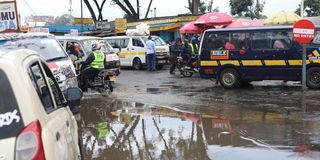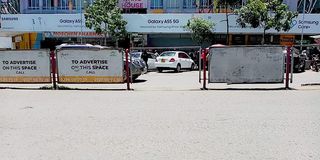How rampant vandalism hurts businesses in Nakuru city

A section of metal bars around Pinkam roundabout in Nakuru city have been vandalised.
As the fourth city, Nakuru is grappling with a rising tide of vandalism that is significantly impacting local businesses and residents.
Vandalized street furniture is enabling burglary, leading to substantial financial losses for business owners.
Mtaa Wangu explores the effects of vandalism in Nakuru city centre, featuring insights from the city manager, Gitau Thabanja.
Thabanja emphasizes that the individuals responsible for this damage are often residents of Nakuru, suggesting that it is unlikely for outsiders to travel and vandalize local infrastructure.
He finds this disheartening because the very community affected by this vandalism, may also be the perpetrator.

A newly erected 'No Entry' sign at pinkam roundabout that is usually vandalised.
Pointing out an area that had been affected, he highlights the theft of metal plates installed between Kanu House and Gate House. These plates, intended for advertising, have continuously been stolen, likely ending up in scrap metal yards.
“These sections not only generated revenue but also serves as the face of Nakuru as you access the city centre. If this trend continues, we may be left with nothing but metal bars, something that does not present great aesthetics for the city,” Thabanja laments.
Moreover, businesses that invest in advertising face financial losses if their ads are vandalized. Thabanja points out that this has implications on the city's economy.

Some of the panels used to display advertisement outside Cigma building have been vandalised.
On the issue of traffic control, Thabanja notes that the destruction of street signage has led to confusion among motorists.
While some residents may navigate the city without difficulty, he asks residents to think how challenging it can be for visitors.
“Signs indicating no entry on one-way streets and street names have been vandalized, leading to chaotic traffic conditions. This leads to motorist using different streets wrongly complicating the work of enforcement officers,” he explains.
Vandalism has even resulted in life-threatening situations where Thabanja recalls numerous complaints about open manholes, whose seals have been stolen.
“We have seen individuals suffer serious injuries, including broken legs, while others have been fortunate to escape without harm because people stole the seal to the manholes to place them on sale,” he shares.
Regarding this, he sounded a warning to those doing it, noting that the law will catch up with them.
“We will not allow a few people to compromise the security of people living in Nakuru," he says.
The city manager also emphasizes the detrimental effect of vandalism on Nakuru’s business community.
Streetlights and CCTV cameras, which were intended to enhance security, have been targeted as well. When connection cables are destroyed, criminals take advantage, increasing theft incidents in business areas.
Mtaa Wangu recently reported on two electronic business owners who collectively lost over a million shillings to burglary, with losses of 700,000 and 400,000 shillings respectively.
Thabanja warns that those caught vandalizing city property will face legal consequences.
Under the Scrap Metal Act of 2015, "A person shall not remove, deface or destroy any scrap metal from the infrastructure designed for roads, bridges, railways, pipelines, telecommunication, electricity, water and sewerage, or any government infrastructure project. Any person who contravenes this commits an offence and is liable on conviction to a fine not exceeding ten million shillings or to imprisonment for a term not exceeding three years or to both."
He adds that restoring vandalized infrastructure can be a lengthy process due to budget constraints, noting that this is subject to the budget of each financial year.
Thabanja calls on residents to act as responsible stewards of the city, highlighting that funds allocated for repairs could be better used for new projects that benefit the community.


